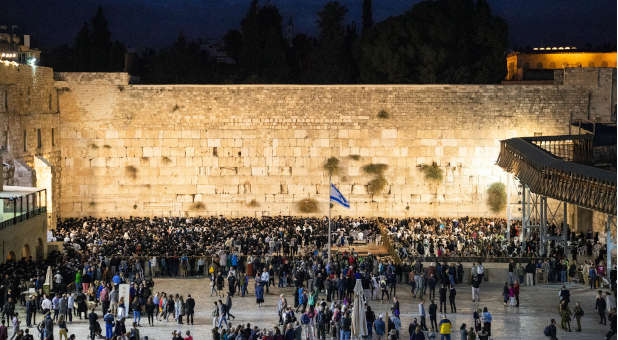We Must Have This Heavenly Perspective on Israel
For many young Christian Americans, Jerusalem and Bethlehem are places of Biblical fiction. For others, especially in the past three months, they’re regions of violence and turmoil.
But what happens when they become real places—the very streets where Jesus and his apostles walked, and real people live today?
In June, Passages—a nonprofit that offers pilgrimages to Israel for Christian U.S. students—returned to Israel for the first time since the pandemic began in early 2020.
Passages launched in 2015 with the belief that a trip to Israel should be a rite of passage for every Christian. These trips explore the origins of both ancient Biblical faith and of a present-day nation, rich with culture, diversity, beauty, and challenges. Ninety-five percent of students that take the trip say they return with a strengthened sense of faith and that the experience was “a turning point” in their beliefs.
As support for Israel among younger evangelical Christians falls, and the media focuses largely on the violence and political divisions, it’s more important than ever that young Christians see firsthand the divisiveness of hate and the endurance of faith. The trips have taken on a whole new meaning as we hear the firsthand stories from those affected by riots across the region and by rockets in the south of Israel. How are residents rebuilding a life out of the rubble? How is God working in the region? Students are able to see Israel as not just the birthplace of the Bible, but to appreciate the voices that got lost in the weeds of the larger politics.
One of those voices on our recent trip was Yoav Bunder, a tire shop owner whose shop was burned during the riots in Lod, a city that suffered significantly during the riots. Another was Tahael, an Orthodox Jew who lives in Lod with her husband and two children—and no longer allows her kids to play in the street.
The only way to fully experience a culture is to walk on its soil and talk to its people. For Christians visiting Israel, this is more important than ever. We are in a critical time when our next generation of Christian leaders should be examining the origins of their faith and how that faith intersects with real people of all beliefs and backgrounds.
Throughout our first trip back in Israel since the pandemic began, Passages staff and alumni spoke with families from different religions and ethnicities (including Muslims, Jews, Christians, Palestinians and Israelis), in addition to political leaders like Member of Knesset Elazar Stern, Intelligence Minister in the newly-formed Israeli Government. We also had the opportunity to stay in hotels where we were the first guests since the pandemic hit, buy from shops that haven’t seen customers in months, and sit at tables to share meals with those who have felt the burden of political and cultural unrest.
As the world is still taking its first tentative steps towards normalcy, we hope that this trip will propel more students to venture outside the U.S. to better understand their faith. The only way to understand different cultures and communities is to spend time in them. No book or video can ever provide the same experience. That’s why Passages plans to bring over 1,000 American students to Israel by the end of 2021 and 3,000 students by the summer of 2022.
Mainstream media often focuses on Israel’s “legacy of violence,” but the truth is that war and conflict have always sold papers. “Love,” “culture,” and “friendship”—these are the words that 12 students used to describe their recent trip to the Holy Land. “Love” might not be as “click-worthy,” but it’s what our future Christian leaders are going to need to compassionately navigate the world ahead of them. {eoa}
Scott Phillips is executive director of Passages, a nonprofit organization offering Christian college students a fresh and innovative approach to experiencing the Holy Land.
Read articles like this one and other Spirit-led content in our new platform, CHARISMA PLUS.
















































